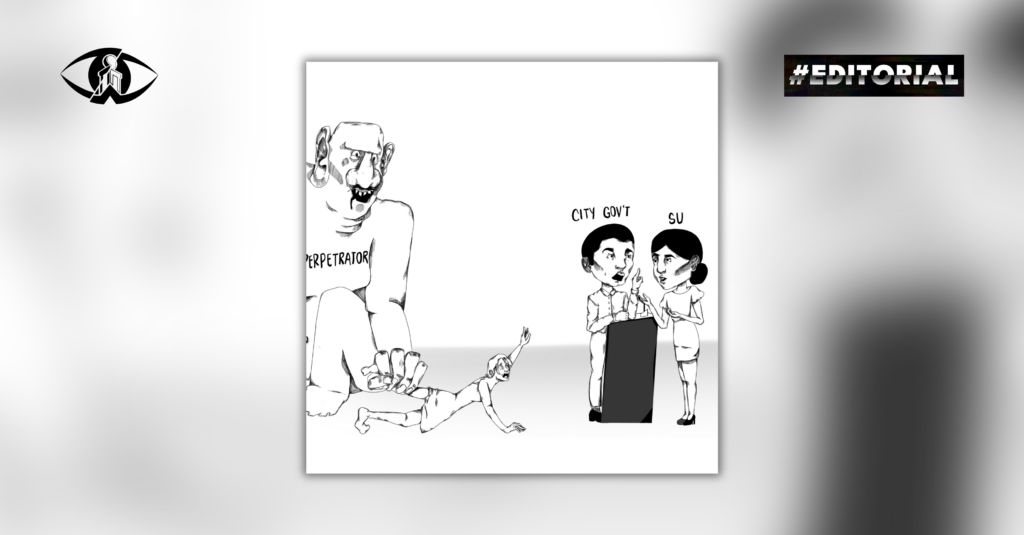the Weekly Sillimanian | November 17, 2023

Fighting crime and injustice will never end well if victims are presented with less assistance by individuals responsible for protecting them. They often fall short of bridging the gap between legality and morality.
Last Sept. 8 to Oct. 17, 2022, several Sillimanian women reported alleged harassment cases against a man roaming around Silliman University (SU). The reports stated that he committed various ways of harassment, ranging from forcefully touching a lady’s leg to attempting to break inside a car with four women inside.
While action had seemingly been taken after those incidents after the man was brought to a psychiatric center, on Nov. 7 of this year, the same man was spotted around SU, reportedly attempting to harass another woman. This news evoked the same sense of dread felt by the alleged Sillimanian victims.
Cases like this often leave us questioning the law and its effectiveness. While specific parameters are there to address harassment cases, we ask ourselves why—despite how long this issue has been in the books—is this man still freely walking the streets of Dumaguete? Were there no complaints filed against him to stop him from committing such acts in the future? Why do the authorities not give any immediate attention to give these alleged Sillimanian victims a chance to speak for themselves?
The answer is simple: Other Sillimanian victims were unable to submit written and legal reports indicating the complaint because of a lack of information, fear, and support—save for a brave few who turn to social media where it is still less likely to be recognized by the authorities as an act for investigation and complaint. Meanwhile, the alleged suspect, diagnosed with mental illness, was not claimed by his family in the rehabilitation center. Both of these persistent realities can be attributed to insufficient policies and awareness of such policies that are specific to cases of sexual harassment.
To address this, we from the Weekly Sillimanian call for action from the Dumaguete City government as well as the SU Administration and the SU Student Government (SUSG) to immediately act in institutionalizing methods to help these alleged victims confirm and fight their cases against harassment.
On one hand, much of this problem can only be addressed if the government takes responsibility for perpetrators like the man in question. In this particular case, continuously passing the buck to determine who takes responsibility helps no one; instead perpetuating the same destructive cycle we see currently. If it takes structural change for this cycle to end, then it must be done.
Meanwhile, even if the SU administration and SUSG have commendably done their utmost in mostly individual capacities to address cases such as these, we believe that more can be done—structurally and policy-wise—to better cater to survivors of sexual harassment as well as focus on being more proactive rather than reactionary.
We call on the SU administration to create a Commission on Decorum and Investigation, a group of individuals who would significantly aid in the victims’ fight for justice, as stipulated by Republic Act No. 11313. Through this step, victims would be able to see that a dedicated body is present in carrying out their concerns on such matters to the law.
We also call on the SUSG Students’ Rights and Welfare Committee to publicize their submission of report guidelines—specifically ones dedicated to cases of sexual harassment. Without knowledge of these guidelines, students have no choice but to either post their concerns on social media because they lack the knowledge on legally raising their complaints on such cases or keep silent altogether.
The absence of these university sections robs Sillimanians of their right to due process and safety. As a university and as a body dedicated to serving the Sillimanians’ needs, it is head-scratching that such crucial aspects of their operations would be absent when the situation calls for it.
Oftentimes, we are too proud of our efforts and cries to end crimes and injustice. We boast that we champion initiatives that “highlight every Sillimanian.” But when real-life situations that threaten Sillimanians occur, we are left with no arsenal to deal with them effectively.
Our cries to end injustice are loud and strong. But when these cries become deafening and lacking in substance, many unheard cries emerge in the shadows.


